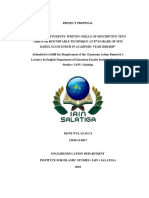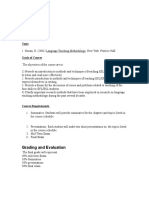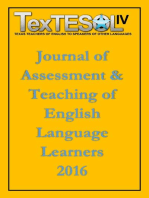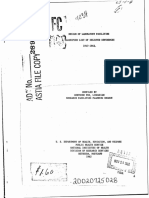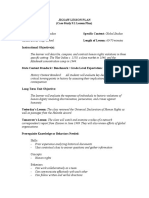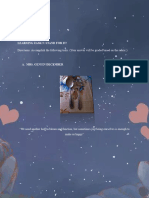Ijeltal Author Guidelines 2022
Ijeltal Author Guidelines 2022
Uploaded by
Deni ApriadiCopyright:
Available Formats
Ijeltal Author Guidelines 2022
Ijeltal Author Guidelines 2022
Uploaded by
Deni ApriadiCopyright
Available Formats
Share this document
Did you find this document useful?
Is this content inappropriate?
Copyright:
Available Formats
Ijeltal Author Guidelines 2022
Ijeltal Author Guidelines 2022
Uploaded by
Deni ApriadiCopyright:
Available Formats
Author Guidelines
IJELTAL (Indonesian Journal of English Language Teaching and Applied Linguistics)
State Islamic University Sultan Aji Muhammad Idris Samarinda
1. Articles should be original, unpublished and not under review for possible publication in
other journals.
2. Manuscript should be typed in MS Document format, single spacing on A4-paper size, 10
to 20 pages, or about 4.000-11.000 words.
3. The article should be written in English. The title of the article is written not more than
15 words.
4. All submission must include 100 - 250 words abstract and 3-5 keywords. The abstract of
research paper should contain the purposes, methodology, and findings of the study.
5. Full name(s) of the author(s) must be stated, along with his/her/their institution and email
address;
6. All references must follow the APA style as far as possible.
7. It is strongly suggested to use MENDELEY or ZOTERO
8. Article Format
Title
Author(s) Identity
Abstract
Keywords
1. Introduction
2. Literature Review
3. Research Methodology
4. Findings
5. Discussion
6. Conclusion
References
Submit the manuscript to online system of IJELTAL (http://ijeltal.org) or via e-mail
(ijeltalj@gmail.com).
Referencing Style
IJELTAL (Indonesian Journal of English Language Teaching and Applied Linguistics)
State Islamic Institute of Samarinda
Journal Article
Al Zahrani, B. S. & Elyas, Tariq. (2017). The Implementation of Critical Thinking in a Saudi
EFL Context: Challenges and Opportunities. IJELTAL (Indonesian Journal of English
Language Teaching and Applied Linguistics), 1(2), 2017.
Cendra, Anastasia Nelladia. (2017). BBC Radio Drama Series Cabin Pressure: Abu Dhabi for
Giving Listening Exposure to Students: A View from Humour Perspective. Indonesian
Journal of EFL and Linguistics, 2(2), 2017
Nurhayati, Dwi Astuti Wahyu. (2016). Using Local Drama in Writing and Speaking: EFL
Learners’ Creative Expression. Journal of English Language Teaching and Linguistics,
Vol 1. No 1, 2016. doi: http://dx.doi.org/10.21462/jeltl.v1i1.13
Book
Halliday, M.A.K dan Matthiessen, Christian. (2004). An Introduction to Functional Grammar.
London: Arnold.
Punch, K. F. (2014). Introduction to Social Research: Quantitative and Qualitative Approaches.
London: Sage Publications Ltd.
van Leeuwen, T. (2008). Discourse and Practice. New Tools for Critical Discourse Analysis.
New York. Oxford University Press.
Chapter in Book
Davidson, J., & Tesh, J. (1997). Theory and practice in language program organization design. In
M. A. Christison, & F. Stoller, A Handbook for Language Program Administrators (pp.
177-198). Burlingame, CA: Alta Book Center.
Fairclough, N., Mulderrig, J. and Wodak, R. (2011). Critical Discourse Analysis. In Van Dijk
(ed.) Discourse Studies. A multidisciplinary Introduction. London: Sage.
Van Dijk, T. A. (2007). Macro Contexts. Lecture First International Conference on Discourse
and Intercultural Relations, University of Murcia, September 2004. In U. Dagmar Scheu
Lottgen and José Saura Sánchez (Eds.), Discourse and International Relations. (pp. 3-
26). Bern: Lang.
Internet Source
Nadzrah Abu Bakar. (2007). Factors that contribute to the effective use of computers in the
classroom: A case study. AsiaCall Journal Online Vol 2. Retrieved April 14, 2009 from
http://www.asia-call.org/AsiaJournal2.php Nov2007.
Conference Paper / Proceedings
Fauzan, Umar. (2014). Developing EFL Speaking Materials for the Second Semester Students of
STAIN Samarinda. Proceedings of 61th TEFLIN International Conference. Oct, 2014. pp.
861-864. UNS Surakarta.
Thesis
David Post, Michael. (2009). Representations of Meaning Within Textual Personas: An Analysis
of 2008 US Presidential Campaign Speeches. Unpublished Thesis. Magister Program.
University of Birmingham.
You might also like
- Parenting A Dynamic Perspective 3nbsped 1506350429 9781506350424Document814 pagesParenting A Dynamic Perspective 3nbsped 1506350429 9781506350424Fiola ArifajNo ratings yet
- Leonard K. - KEMPF. Encyclopedia of Social Measurement A-G Volume 1 (2005, Elsevier) PDFDocument899 pagesLeonard K. - KEMPF. Encyclopedia of Social Measurement A-G Volume 1 (2005, Elsevier) PDFthe plagues100% (1)
- CV Sept 2022Document49 pagesCV Sept 2022Kevin JiangNo ratings yet
- Marine Engineering Multiple Choice Question With AnswersDocument6 pagesMarine Engineering Multiple Choice Question With AnswersFarman Ali100% (1)
- (Feb 2022) Dr. Fareed DarDocument8 pages(Feb 2022) Dr. Fareed Darsmominafk17No ratings yet
- Daftar PustakaDocument6 pagesDaftar PustakaHasanAtmacaNo ratings yet
- Revisi RefrencesDocument10 pagesRevisi RefrencesRonald OfficialNo ratings yet
- Writting Difficulties - MirrahDocument8 pagesWritting Difficulties - MirrahRani Rahmawati SyafrinNo ratings yet
- Proforma For Project Proposals of Aff. Colleges For Undergrade Degree ProgramDocument7 pagesProforma For Project Proposals of Aff. Colleges For Undergrade Degree ProgramihsanNo ratings yet
- ReferencesDocument5 pagesReferencesFiki SetiawanNo ratings yet
- Rhetorical Pattern in Argumentative Essay WritingDocument12 pagesRhetorical Pattern in Argumentative Essay WritingHai NguyenNo ratings yet
- Reference StyleDocument1 pageReference Stylej3l2868No ratings yet
- ReferencesDocument14 pagesReferencesjamalNo ratings yet
- Writing For Comprehension in Prose Fiction Analysis: The Students' VoicesDocument12 pagesWriting For Comprehension in Prose Fiction Analysis: The Students' VoicesGede WanNo ratings yet
- Template Baru Nazhruna 2020Document5 pagesTemplate Baru Nazhruna 2020Janah FatihNo ratings yet
- 231-Article Text-428-1-10-20170102Document14 pages231-Article Text-428-1-10-20170102Tran Ngoc DiepNo ratings yet
- Significance of Teaching Literature in The EFL Classroom: December 2018Document7 pagesSignificance of Teaching Literature in The EFL Classroom: December 2018Tahar RechidiNo ratings yet
- Proposal ResearchDocument31 pagesProposal ResearchYeccy AjjhaNo ratings yet
- 3940 12677 1 PBDocument8 pages3940 12677 1 PBQandeel FatimaNo ratings yet
- REFERENCES SementaraDocument4 pagesREFERENCES SementarakhumairohNo ratings yet
- Bibliography: BooksDocument17 pagesBibliography: BooksshivNo ratings yet
- How To Be Civil With Words Asian ESP Journal 17 7Document176 pagesHow To Be Civil With Words Asian ESP Journal 17 7Ahmed MubarakNo ratings yet
- TakadDocument4 pagesTakadshahnewaz.eeeNo ratings yet
- SEMINAR ON ELT SyllabusDocument9 pagesSEMINAR ON ELT SyllabusErwin Hari KurniawanNo ratings yet
- PROPOSAL FebyDocument26 pagesPROPOSAL Febyrahmathia tiaNo ratings yet
- (Rustipa 2013) The Pedagogical Implications of CoherenceDocument13 pages(Rustipa 2013) The Pedagogical Implications of CoherenceBoo SeebooNo ratings yet
- Introduction in Applied Linguitics by Indonesian and English WritersDocument15 pagesIntroduction in Applied Linguitics by Indonesian and English WritersIndra Dwi PutraNo ratings yet
- Name Designation Research Interests: Amzad26@uap-Bd - EduDocument2 pagesName Designation Research Interests: Amzad26@uap-Bd - EduGolam ZakariaNo ratings yet
- Revise MeyDocument18 pagesRevise MeySuhendro OktantoNo ratings yet
- Cara Penulisan References Dalam Bahasa InggrisDocument5 pagesCara Penulisan References Dalam Bahasa Inggrisnyimas ayu wulandariNo ratings yet
- References FinalDocument12 pagesReferences FinalIrika SapanzaNo ratings yet
- BASIS TemplateDocument3 pagesBASIS Templateicaresfor1No ratings yet
- RPS 202320190068Document2 pagesRPS 202320190068thatsraffi191No ratings yet
- Full Paper English Composition Writing Skills at Ordinary Level and Its Effect On Students' PerformanceDocument15 pagesFull Paper English Composition Writing Skills at Ordinary Level and Its Effect On Students' PerformanceAnnie RajpootNo ratings yet
- CV 941Document6 pagesCV 941adi497singhNo ratings yet
- REFERENCESDocument4 pagesREFERENCESNawang NawangsihNo ratings yet
- Grading and Evaluation: TextsDocument3 pagesGrading and Evaluation: Textshuda1984No ratings yet
- المراجعDocument25 pagesالمراجعkhaled samirNo ratings yet
- Proposal Hendra Hari IniDocument28 pagesProposal Hendra Hari IniHendra GunawanNo ratings yet
- Benjamin - 2012 - The Aslian Languages of Malaysia and Thailand AnDocument100 pagesBenjamin - 2012 - The Aslian Languages of Malaysia and Thailand AnEDGAR JUDE DE SOUZA (Student)No ratings yet
- Connexion,+157 184+Rhetorical+Move+StructuresDocument28 pagesConnexion,+157 184+Rhetorical+Move+StructuresHiếu Nguyễn MinhNo ratings yet
- English 1Document4 pagesEnglish 1twumasisandra8No ratings yet
- CV 1471 0 1685446814 1Document12 pagesCV 1471 0 1685446814 1mamostay gawraNo ratings yet
- The Advantages of Teaching Short Stories in ESL Classrooms: A Critical EvaluationDocument9 pagesThe Advantages of Teaching Short Stories in ESL Classrooms: A Critical EvaluationcoffexyouNo ratings yet
- 04 An Analysis of Sentence Structure in The Students' Writing A Case Study at Third Class of SMA Al-Ikhwan Kota BimaDocument8 pages04 An Analysis of Sentence Structure in The Students' Writing A Case Study at Third Class of SMA Al-Ikhwan Kota BimaFeriyadin NtbNo ratings yet
- Pedagogical Stylistic Analysis of Qasira Shahraz S A Pair of JeansDocument12 pagesPedagogical Stylistic Analysis of Qasira Shahraz S A Pair of JeansKha OulaNo ratings yet
- Communication Skills PDFDocument3 pagesCommunication Skills PDFHassanNo ratings yet
- Harvard Referencing Guide: Journal Title in Italics With CapitalsDocument6 pagesHarvard Referencing Guide: Journal Title in Italics With CapitalsRalboy Ral MogakabeNo ratings yet
- Summary Constructing Grounded Theory By: by A Hamzah FansuryDocument6 pagesSummary Constructing Grounded Theory By: by A Hamzah FansuryAndy Hamzah FansuryNo ratings yet
- 2022 UTS Discourse AnalysisDocument1 page2022 UTS Discourse Analysisirmayani irmayaniNo ratings yet
- Jimola & Dada (2023)Document18 pagesJimola & Dada (2023)Siti FaridahNo ratings yet
- Difficulties Facing by Students of l1 in Adopting l2Document6 pagesDifficulties Facing by Students of l1 in Adopting l2MoinAhmadNo ratings yet
- Author Guidelines IJAL UPIDocument4 pagesAuthor Guidelines IJAL UPIHusni Chuznie MubarokNo ratings yet
- Dini Andini - 192122040Document5 pagesDini Andini - 192122040john kristianNo ratings yet
- University of Delhi: Four Year Undergraduate ProgrammeDocument7 pagesUniversity of Delhi: Four Year Undergraduate ProgrammeNaga RajNo ratings yet
- Journal of Nusantara Studies (JONUS)Document18 pagesJournal of Nusantara Studies (JONUS)Kevin RajNo ratings yet
- Inbound 7965746456409068057Document17 pagesInbound 7965746456409068057Jerome Negrete TumayaoNo ratings yet
- Cohesive Devices Used in Argumentative Essays ofDocument24 pagesCohesive Devices Used in Argumentative Essays ofSABERON GELHMARNo ratings yet
- Scopusresults AJELPDocument6 pagesScopusresults AJELPMohd Shahrizal Mohamad RidzuanNo ratings yet
- CHAPTER I yang paling bener (bismillah)Document10 pagesCHAPTER I yang paling bener (bismillah)MUHAMMAD REZKY ADITYANo ratings yet
- Daftar Pustaka: Saeful Uyun, 2015Document6 pagesDaftar Pustaka: Saeful Uyun, 2015Rei HanzNo ratings yet
- English 3Document2 pagesEnglish 3twumasisandra8No ratings yet
- Acing The New SATDocument7 pagesAcing The New SATtajoar ananNo ratings yet
- Grade 10 Exam Scope - Nov. 2024Document1 pageGrade 10 Exam Scope - Nov. 2024naidoo.dhanishta29No ratings yet
- Design of Laboratory Facilities: - Gertrude LibrarianDocument19 pagesDesign of Laboratory Facilities: - Gertrude LibrarianJhenikka Mae LiwagNo ratings yet
- Industrial - Training - 2020-21 Report (Wadkar Shrikant)Document32 pagesIndustrial - Training - 2020-21 Report (Wadkar Shrikant)RajuNo ratings yet
- Jigsaw 1Document6 pagesJigsaw 1api-315606787No ratings yet
- Traditional SDLC Vs Scrum Methodology - A Comparative StudyDocument5 pagesTraditional SDLC Vs Scrum Methodology - A Comparative StudyannitaadwiNo ratings yet
- Science 5 DLP Feb 23, 2023 FinalDocument4 pagesScience 5 DLP Feb 23, 2023 Finalrachelle.pedro100% (1)
- Data Mining AlgorithmesDocument166 pagesData Mining AlgorithmesLipika GirapNo ratings yet
- Newsletter Final VersionDocument24 pagesNewsletter Final VersionAdv. Mohammad Shayan UsmaniNo ratings yet
- Who Alc Icope BrochureDocument2 pagesWho Alc Icope BrochureMahiPal Raperia100% (1)
- WIMO Final 2019 - Khối 5Document12 pagesWIMO Final 2019 - Khối 5Dai Nguyen Thi XuanNo ratings yet
- SVOLNov 07Document16 pagesSVOLNov 07Rosali Mee VaipulyaNo ratings yet
- "Reliance Industries, Jamnagar": "Refinary Construction Project J3"Document4 pages"Reliance Industries, Jamnagar": "Refinary Construction Project J3"digvijay singhNo ratings yet
- TOS For SY 2021-2022Document22 pagesTOS For SY 2021-2022Norman T. RegalNo ratings yet
- Gender Youth Identity: Social and Personal IdentityDocument4 pagesGender Youth Identity: Social and Personal IdentityKhushi NadgaudaNo ratings yet
- EAPP Module 8Document23 pagesEAPP Module 8RO BieNo ratings yet
- Da KLP 1Document18 pagesDa KLP 1sariNo ratings yet
- Getting Along: Related Kidshealth LinksDocument6 pagesGetting Along: Related Kidshealth LinksMarilyn AtienzaNo ratings yet
- Teori Dan Prinsip PKN Handout-1Document17 pagesTeori Dan Prinsip PKN Handout-1Kadek WidyaNo ratings yet
- Carandang - Learning Task 5Document7 pagesCarandang - Learning Task 5cybell carandangNo ratings yet
- 0610 BIOLOGY: MARK SCHEME For The October/November 2014 SeriesDocument2 pages0610 BIOLOGY: MARK SCHEME For The October/November 2014 Seriesmath magicNo ratings yet
- Exemplar 2Document3 pagesExemplar 2api-252309583No ratings yet
- Imrad FormatDocument5 pagesImrad FormatPeach BubbleNo ratings yet
- AM Planning Task - Assignment 2Document3 pagesAM Planning Task - Assignment 2Priyanshu PatilNo ratings yet
- Brewer Et Al 2011 Meditation Experience Is Associated With Differences in Default Mode Network Activity and ConnectivityDocument6 pagesBrewer Et Al 2011 Meditation Experience Is Associated With Differences in Default Mode Network Activity and Connectivitytiagodeoliveira.ptNo ratings yet
- Philosophy and Political Thought (PPT) Semester II, 2013: Hayy Ibn Yaqzān, Pp. 95-166Document4 pagesPhilosophy and Political Thought (PPT) Semester II, 2013: Hayy Ibn Yaqzān, Pp. 95-166tomhardyeezNo ratings yet
- Dissertation On Rites of PassageDocument7 pagesDissertation On Rites of PassageHelpMeWithMyPaperAnchorage100% (1)

















